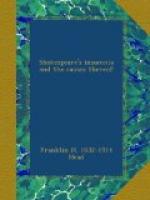The Curator further instructs me to convey to you the thanks of the Board of Governors for these highly important papers, and to state to you that they may be found on file in sub-compartment No. 113,280 of Contemporary Documents.
I am further instructed by the Curator to inform you that compliance with your request that this institution reciprocate your kindness by loaning to you all papers from the recently discovered Southampton Shakespeare Collection, bearing date in the years 1593, 1602, and 1609, is contrary to the regulations of this institution. If you cannot visit London to examine these interesting manuscripts, copies will be made and transmitted you for three halfpence per folio, payment by our rules invariably in advance. I note that you are evidently in error upon one point. The collection contains no letters or manuscripts of Shakespeare. It is composed principally of letters written to Shakespeare by various people, and which, after his death, in some way came into the possession of the Earl of Southampton. His death, so soon after that of Shakespeare, doubtless caused these letters to be lost sight of, and they were but last year discovered in the donjon of the castle. I have examined the letters for the years you name, and find that copies of the same can be made for L3 3s., exclusive of postage.
Very respectfully yours,
John Barnacle,
10th Ass’t Sub-Secretary.
The money having been forwarded, I received in due time the copies. At the first date, 1593, Shakespeare was a young dramatist and actor struggling for recognition, poor and almost unknown; in 1602 he had won an assured position among his fellows, and, with the thrift which characterized him, had secured an interest in the Globe Theatre, where his plays were performed; in 1609 he was in the fulness of his contemporary fame, had bought valuable property in Stratford, and was contemplating retirement to his country home.
The following are the letters from the Southampton collection which serve to throw light upon the insomnia of Shakespeare. They are given in their chronological order, and verbatim, but not literatim, the orthography having been modernized. The first of the letters, dated in 1593, is from a firm of lawyers, Messrs. Shallow & Slender, and is as follows:—
Inner Temple, London, Feb. 15, 1593.
To William Shakespeare:
Mr. Moses Solomons, an honored client of our firm, has placed with us, that payment may be straightway enforced, a bill drawn by John Heminge, for L10, due in two months from the date thereof, and the payment of which was assured by you in writing. This bill has been for some days overdue, and Mr. Solomons is constrained to call upon you for payment at once. Your prompt attention to this will save the costs and annoyance of an arrest.
The second letter is from the same parties, and bears date four days later than the first.




